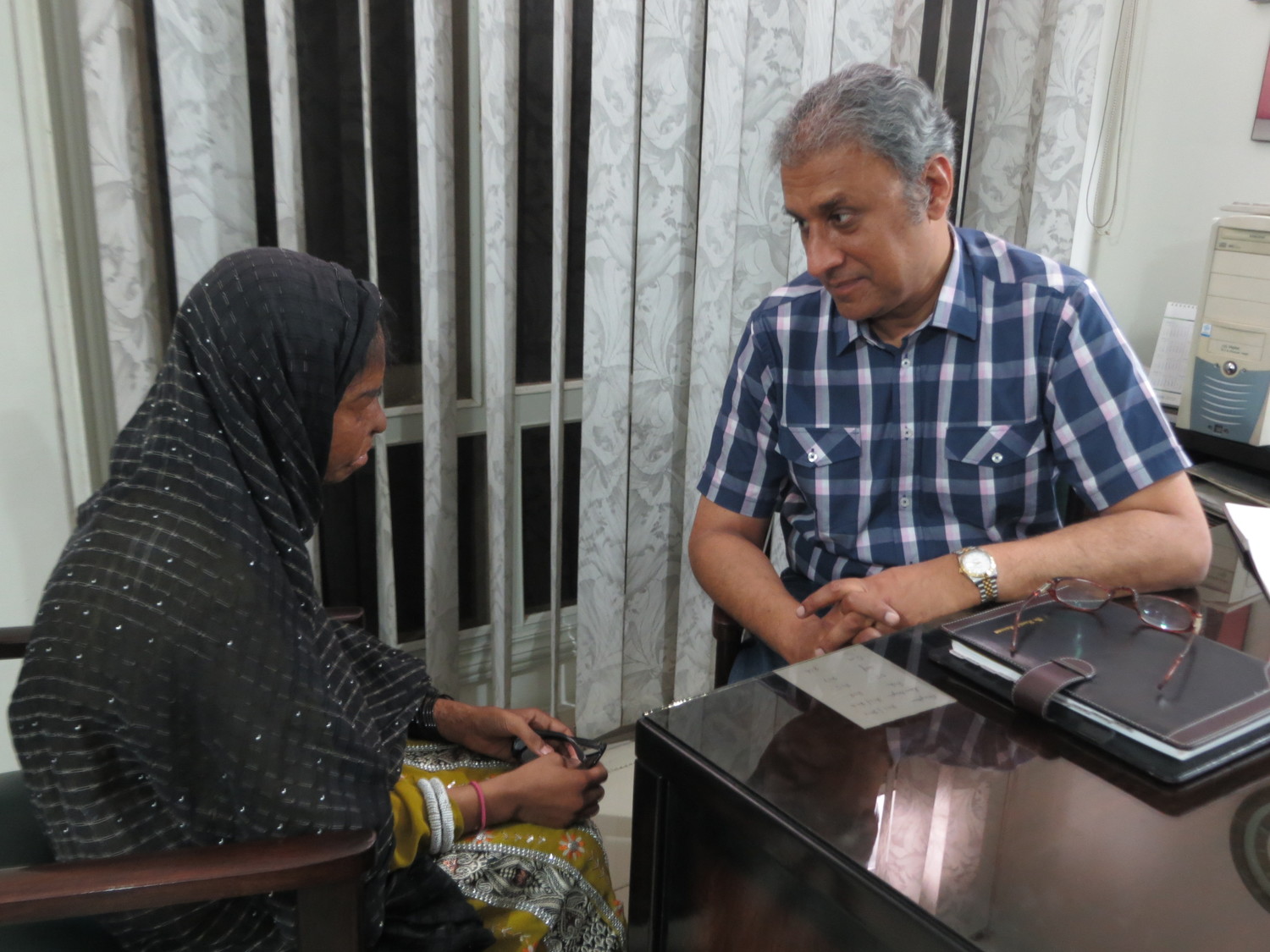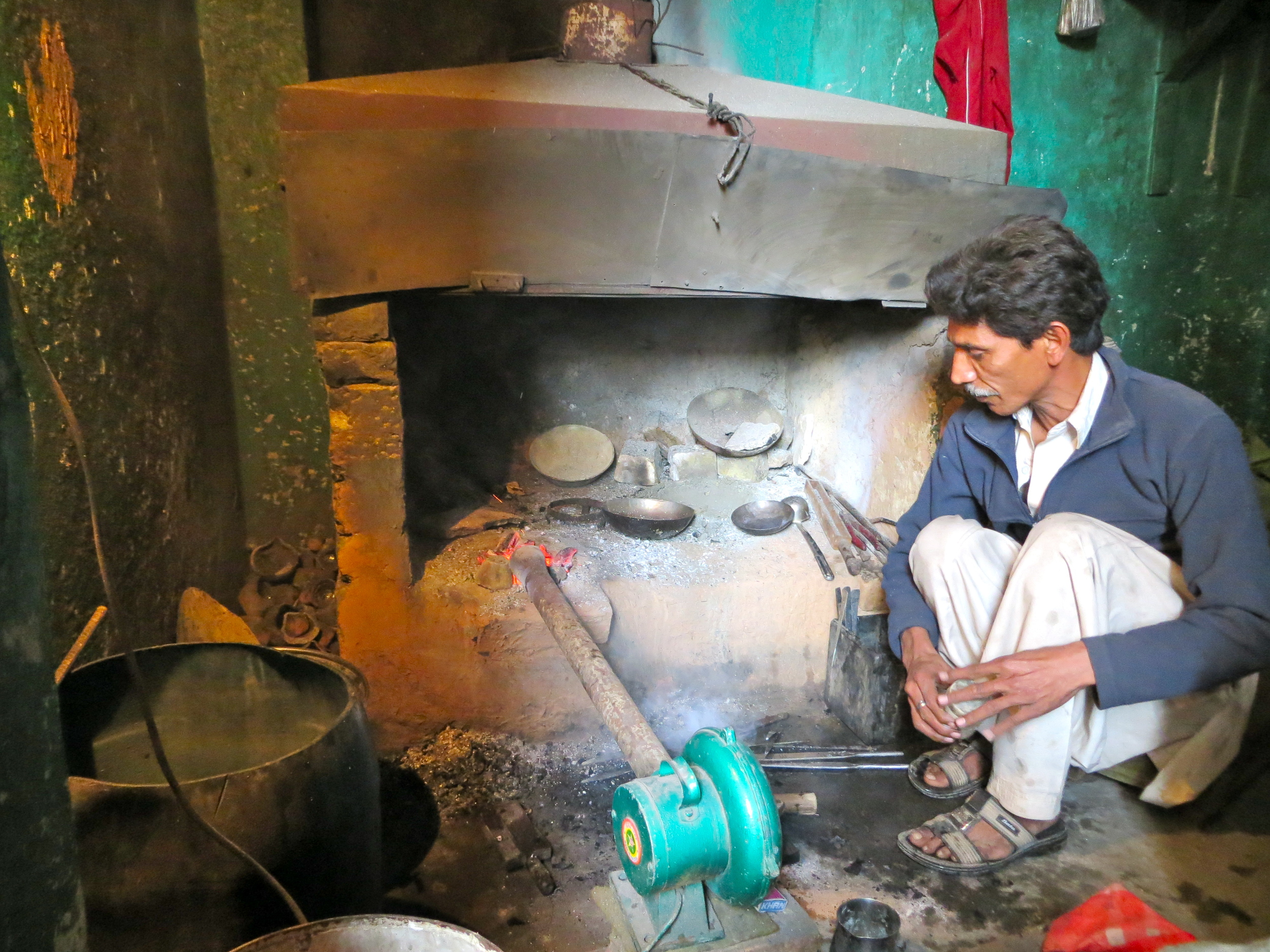Nawaz Sharif — the man most likely to become Pakistan’s next prime minister has set two priorities: Boosting his country’s economy, and bringing peace for Pakistan. Tune in below to hear me to talk to Marco Werman, host of PRI’s The World, about Sharif’s policy agenda.
[ONLINE] AHMEDIS AND THE PAKISTANI ELECTION
"With just hours left before voters begin casting their votes for Pakistan's next leaders, political posters are plastered across markets, convoys of motorcycles and cars flying party flags clog major thoroughfares, and raspy-voiced candidates make their final appeals to throngs of people. Election fever runs high everywhere, it seems, but in Rabwah.
The city nestled alongside the Chenab River in Punjab is home to an estimated 40,000 potential voters, but the vast majority of them will not be voting in the upcoming election due to their faith. Rabwah is a haven for Ahmedis, who make up over 95 percent of its population. While Ahmedis consider themselves Muslims, the Pakistani government has officially declared them otherwise.
The groups' adherence to Mirza Ghulam Ahmed, a man they see as a prophet, is heretical to most Muslims, who hold that the Prophet Muhammad was the last messenger of God. This difference of beliefs has made Ahmedis the subject of scorn in Pakistan, where they could be subject to death for practicing their faith since doing so would mean engaging in the illegal act of "posing as a Muslim."
While they aren't officially barred from voting, Ahmedis must sign a statement renouncing their faith in order to cast a ballot."
Read more about how Ahmedis and the election in this article for Foreign Policy Magazine's AfPak Channel.
[ONLINE] AN ESSAY ON SITAR IN SIX PARTS
"In the end, it seems that no identity is wholly administered. We pick the parts of ourselves we wish to carry around in our pockets and leave others tucked into drawers, hidden away, even from ourselves. Of course, our social selves are constantly renegotiated, and half of any culture is compromise. Knowing this, my mother had a makeshift kitchen set up in the garage to keep the pungency of her curries from settling into our sofas and pillows, from seeping right into the drywall. Still, I wonder what combination of ideas led me to so readily take up the sitar, and whether George Harrison or Ravi Shankar had more to do with it." Read the rest of this long form essay about sitar at The Morning News.
[ON AIR] AQUAPONICS SITE IS A MANMADE -- AND SUSTAINABLE -- OASIS FOR ABU DHABI
[ON AIR] HOPE FOR PAKISTAN'S STREET CHILDREN
In Islamabad, a self-sustaining organization called Lettucebee Kids is working to help out young people who have very adult responsibilities. Through Saturday afternoon drawing sessions and summer classes in a local computer lab, Sarah Adeel, the founder of the organization, seeks to teach the children the skills they will need for a formal education. She also hopes to start a community center complete with a garden for the kids to tend, a restaurant for them to manage, and a nursing home for them to connect with community elders. To hear more about Adeel's vision and to see what life is like for Mohammad Ali, a twelve year old who works to provide for his family tune in to the rest of the story for DW's Worldlink.
[ON AIR] DESPITE A NEW LAW, JUSTICE REMAINS ELUSIVE FOR ACID-BURN VICTIMS IN PAKISTAN
 [soundcloud url="http://api.soundcloud.com/tracks/86257412" params="show_artwork=false" width="100%" height="166" iframe="true" /]
[soundcloud url="http://api.soundcloud.com/tracks/86257412" params="show_artwork=false" width="100%" height="166" iframe="true" /]
“My friend and I had eaten dinner and gone to sleep. It was 2:00 a.m. when her brother came into the room where we were sleeping. He woke me up and said ‘Come with me.’ iItold him ‘No, whatever you have to say to me, you can say right here.’ He started to tug at me to force me to come with him. He called out to his mother who said, to him ‘She’s going to tell everyone what you tried to do. Throw acid on her. even if she dies we’ll say we don’t know who did it.’”
Yasmeen’s family has undergone a great deal of hardship to pursue a lawsuit against her attacker and his mother, who advised him to throw acid on her when the girl was just thirteen years old. Conviction rates against acid-throwers have risen from 6 to eighteen percent after a new law was passed to criminalize acid throwing in Pakistan, but the details of Yasmeen’s case reveal just how hard it is to win justice in such cases. For more, please see the article for PRI’s The World, which was produced with support from the Pulitzer Center on Crises Reporting.
[ONLINE] REBUILDING SCHOOLS IN PAKISTAN'S SWAT VALLEY
"Although the Pakistani forces largely drove the Taliban out of the Swat Valley, occasional bombings and targeted killings still persist. With the help of reconstruction efforts by nongovernmental organizations (NGOs) and the government, a significant part the area's infrastructure has since been restored. Still, much remains to be done to ensure that Swat residents' quality of life—and education—is not just re-established but rejuvenated. Education experts are working to capitalize on the opportunity to rebuild by moving the education system away from a rote learning model to a style that emphasizes more creative problem-solving. It's this type of instruction that Pakistan's schools were missing before the crisis, and many hope it will strengthen an emerging sense of critical awareness and civic responsibility in Swat." Click here to read the rest of of this article for The American Prospect.
[ONLINE] MUKHTAR MAI: CHANGING VIEWS TOWARDS WOMEN IN PAKISTAN THROUGH EDUCATION
 It takes a bit of doing to get Mukhtar Mai on the phone. She doesn’t give her number out freely owing to threats she’s received for her decade long quest for justice. Still, when I hear her voice, direct and undaunted, I feel my own begin to shrink away.
It takes a bit of doing to get Mukhtar Mai on the phone. She doesn’t give her number out freely owing to threats she’s received for her decade long quest for justice. Still, when I hear her voice, direct and undaunted, I feel my own begin to shrink away.
After all, Mai is a force to be reckoned with. In 2002, Mai was gang-raped under orders from a village council as atonement for a crime that her younger brother had allegedly committed.
[...]
As news of the violence wrought on Mai began to spread, she was called in to a local police station and asked to sign off on a pre-written statement. Illiterate at the time, Mai was neither aware of what the document said nor was she able to sign her own name. With a single thumbprint she consented to its contents, unaware of the implications of this one simple action.
As it turned out, this moment marked a new beginning for Mai. One in which she would become the face of a movement to reform Pakistan’s draconian rape laws which have so often backfired on victims of sexual violence by implicating them for adultery, an offense punishable by death. Standing up against her abusers in court was a very risky move and Mai’s family was far from supportive of her decision to seek legal recourse.
Read the rest of this post featured by the Pulitzer Center on Crises Reporting as part of an ongoing project on education in Pakistan.
[ON AIR] VETS CATER TO A VERY PARTICULAR CROWD AT THE ABU DHABI FALCON HOSPITAL
Falcons can cost up to a $100,000, so it's no surprise that their owners will spare no expense to keep them well. If they ever come down with an illness, break a wing, or even a feather, it's off to the Abu Dhabi Falcon Hospital they go. To hear more about this very particular place, tune in below or head to PRI's The World.
[soundcloud url="http://api.soundcloud.com/tracks/78972842" params="show_artwork=false" width="100%" height="166" iframe="true" /]
[ONLINE] TAHIRUL QADRI: CAN HE BRING A TAHRIR SQUARE STYLE REVOLUTION TO PAKISTAN?
A month ago, few people in Pakistan had heard of Tahirul Qadri, an Islamic scholar living in Canada. But that was before he got on a plane and arrived in Pakistan. Today, for the fourth day in a row, tens of thousands descended upon Islamabad to hear the Sufi cleric-turned-populist leader preach about electoral accountability and an end to corruption.
Read more about Qadri in an article for GlobalPost.
[ONLINE] PAKISTAN'S MISSED OPPORTUNITY TO POLICE RAPE
Days after the Delhi gang-rape victim died, a 9-year-old girl in Pakistan was allegedly abducted from her home and raped by three men. Few Pakistani media outlets carried this story and no demonstrations have been held in support of the young victim -- a muted response is in stark contrast to the protests that are raging in India, demanding justice for the 23-year-old medical student who is alleged to have been raped and brutalized by six men on a moving bus in Delhi. Even if rape in Pakistan received the same kind of attention, however, finding justice for crimes of sexual violence can be an exceedingly arduous task in Pakistan. “I had even more people with me, I felt like the whole world was with me,” said Mukthar Mai, whose gang-rape unleashed an outcry in Pakistan in 2002. “But still I did not receive justice.”
Check out the whole article over at GlobalPost.
[ON AIR] SWEEPING A DUSTY MARKET IN SEARCH OF GOLD
At six in the morning, the only thing can that can be heard in Sarafa Bazaar, the largest gold market in Rawalpindi, Pakistan, is the sound of bristles on pavement. Afsiroon Naqas arrives in the labyrinthine market long before it fills with braying donkeys, rumbling rickshaws and men hawking everything from slices of coconut to lightbulbs.
On hands and knees, he painstakingly sweeps every inch of the street with an old shoe brush. But he and his young son Asad aren’t collecting trash. They’re looking for gold dust that blows out of the jewellery shops around them.
Tune in to the story below, or check it out over at The World.
[soundcloud url="http://api.soundcloud.com/tracks/74245458" params="" width=" 100%" height="166" iframe="true" /]
[ONLINE] THE MAKING (AND BREAKING) OF MALALA YOUSAFZAI
Before she became a world-renowned advocate for girls’ education, before she became a victim of the Taliban’s brutality, before she was nominated for international accolades, Malala Yousafzai was this: a scared little girl. The title of Malala’s first entry in a diary she kept for the BBC in 2009 was ‘I am afraid’. The piece about the media's hand in the construction of Malala the icon, and how she came to fall of the pedestal in the eyes of many Pakistanis for Himal Southasia can be found here.
[ONLINE] PLIGHT OF PAKISTAN'S SHI'A MINORITY
Despite the fact that the country's president and much of its military top brass are Shi'a, attacks on Pakistan's Shi'a Muslims by militant extremists have steadily increased over the past few years, as the Tehreek-e-Taliban Pakistan (TTP) continues to operate largely unfettered. According to the South Asia Terrorism Portal, 902 people were killed in sectarian violence between 2009-2011, and 425 have lost their lives in attacks motivated by religious intolerance in 2012. Human Rights Watch estimates that at least 320 of those killed so far this year were targeted because they were Shi'a. Read the full article on violence against Pakistan's Shi'a Muslims for Foreign Policy Magazine's AfPak Channel here.
[ON AIR] EXPERIENCING THE TRUE EID AL-ADHA
Tune in to it here to a commentary about Eid al-Adha in Pakistan in a commentary for PRI's The World [soundcloud url="http://api.soundcloud.com/tracks/68507505" iframe="true" /]
[ONLINE] PAKISTAN AND THE US ELECTION
Pakistan has long been seen by American analysts as a “wildcard” state—a sort of trick card that either appears as a Queen of Hearts or a Joker depending on when, and for how long, you look. It’s a trick ordinary Pakistanis—who would probably just as readily fill the streets to protest America as they would to claim a visa if the United States decided to offer up them up for free—can play just as well. Nearly three-fourths of Pakistanis polled said they see the United States as an “enemy.” That’s up from 64 percent just three years ago.
As if to say “if you can't beat 'em, join 'em,” another recent poll found that 43 percent of Pakistanis claimed they should have the right to vote in U.S. elections, a number topped only by people in Kenya, China, India, and Cameroon.
Read the article for Foreign Policy In Focus here.
[IN PICTURES] EID AL-ADHA
Eid al-Adha honors the Biblical story in which God asked Abraham to take the life of his son. Muslims all over the world celebrate by slaughtering and sharing the meat of cows, goats, lambs and camels. If you aren't prepared to see a whole lot of red, please avoid the last few slides, as the images are rather graphic. [slideshow]
[ONLINE] PERSONAL REFLECTIONS ON THE ARSON AT MY HOMETOWN MOSQUE
Randolph Linn, 52, has been charged with federal criminal hate crimes for an arson at the Islamic Center of Greater Toledo in Northwest Ohio. He is in police custody and faces chargesfor intentionally defacing, damaging and destroying religious property because of the religious character of that property and using fire and explosives to commit a felony. I spent nearly every Sunday of my life in this mosque, not to mention the countless Friday prayers, iftar dinners, and special events held there, so this attack feels incredibly acute. I wrote my personal reflections to the arson for The Huffington Post here.
[ON AIR] TALKING TO VOTERS IN OHIO'S WOOD COUNTY
There's quite mix of views in Ohio's Wood County. Over half of its voting-aged citizens as registered independents. With only one exception, Wood County has successfully predicted the outcome of the presidential election correctly since 1964, which might be why both Obama and Romney have been spending so much time here. I grew up in here, but was incredibly surprised by what I heard as I moved through two very different parts of the county to collect VOX for NPR's Weekends On All Things Considered. I worked as a producer on the show during my Kroc Fellowship and was only too pleased to get an assignment from the show just days after I'd moved back to Ohio.
I headed first to the weekly Farmers' Market in downtown Perrysburg, the suburb in which I grew up. I spoke to an artisanal salsa maker who told me, "Obama's done nothing about anything. The economy still sucks, unemployment's still bad, [and] he shoved health care down everybody's throat that didn't want it." A few stalls later, I met a woman who decorated onesies to sell in order to raise money to pay for her son's medical bills. She said her family pays more in healthcare than for their house, and while she's gotten some peace of mind from the Affordable Care Act knowing that her son, who recently had a liver transplant, wont be denied coverage because of his condition, she isn't totally satisfied with the job Obama's done.
Then, to touch base with a different aspect of the country, I drove about 20 minutes southeast of my hometown to a small rural community called Luckey, which was hosting its 30th annual Fall Festival, complete with a tractor pull. There, I met two friends who were selling small hand-sewn pumpkins and beaded jewelry who told me about their support for the president. One told me, "When I was laid off, he kept the unemployment [benefits] coming, so that I didn't lose everything." I talked to a lot of people who said they'd be voting for Obama, but there were some who were unabashed about their negative feelings toward him. I then approached on man who was eating a corn dog at a picnic table to ask him about his views about the upcoming election who said he's supporting Mitt Romney because "he don't let the illegals over here and put them in college for free when my grandson can hardly afford to go to college."
To hear from Wood County voters yourself, and to learn more about why its a microcosm of the country as well as why Ohio is so coveted by either candidate, tune in to the segment hosted by NPR's Guy Raz:
[soundcloud url="http://api.soundcloud.com/tracks/62015059" iframe="true" /]
[ONLINE] THE VERY HIGH PRICE OF PANDAS
 Scanning the news last Monday morning, I saw that Mei Xhang, the female panda at the National Zoo, had given birth to a cub after five artificial inseminations and false pregnancies. I raced over to the zoo for a noon press conference and spent a lot of time talking with reproductive physiologist Pierre Comizzoli who calls himself Mei Xiang's "personal gynecologist." After learning how much time, effort, and money goes into the zoos panda program, it was a shock to learn that within a week of its birth, the little cub had died.
Scanning the news last Monday morning, I saw that Mei Xhang, the female panda at the National Zoo, had given birth to a cub after five artificial inseminations and false pregnancies. I raced over to the zoo for a noon press conference and spent a lot of time talking with reproductive physiologist Pierre Comizzoli who calls himself Mei Xiang's "personal gynecologist." After learning how much time, effort, and money goes into the zoos panda program, it was a shock to learn that within a week of its birth, the little cub had died.
I wrote about the high cost of this program, and the impact of "marquee" animals on broader conservation efforts in an article for GlobalPost.









